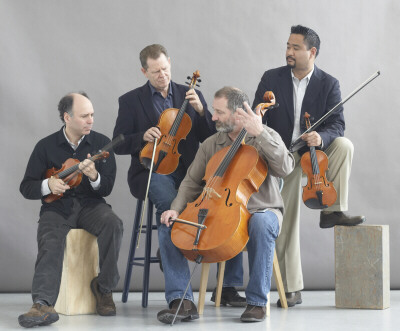Alexander Quartet tunes strings to songs of death
Robert Greenberg and the Alexander String Quartet teamed up for their last joint presentation of this year’s “Inspirations” series, four lectures and concerts drawing parallels between older and modern works. Their Saturday morning concert on May 17 focused on Franz Schubert’s String Quartet in D minor, D.810 (“Death and the Maiden”), and George Crumb’s modern use of that piece in his string quartet, Black Angels.
Greenberg used scholarship and humor to draw our attention to Schubert’s brief life and brevity of expression. In 1817, at the age of 20, he wrote Tod und der Mädchen (“Death and the Maiden”) as a Lieder, an art song for soprano and piano. Its striking D minor opening announces the approach of Death. A high vocal line is the terrified voice of the dying maiden, begging Death to pass her by, then vocal shifts low in the voice as Death comforts her: “Sollst sanft in meinem Armen schlafen!” (Gently you will sleep in my arms.) The introductory theme moves into D major, her gentle acceptance.
And he does this in three minutes!
At the age of 25 he contracted a nasty strain of syphilis. Two years later his strength returned enough for him to compose. Aware of his limited time, he was drawn to the earlier Lieder for the theme and structure of the String Quartet in D minor, but this time thought of his own death, which took him at 31.
The string quartet commences with a fiercely bowed phrase, downward and gripping. They back off to a quiet funeral march, then bring the phrase back in a variation that steps endlessly down. The second movement drifts in with an adaptation of the Lieder. Their harmonies were tight and slowly darkened with cello timbre, moving through variations.
The scherzo comes back to the fierce opening, and in the final movement triplets canter to the ostinato of Death’s horse. Slowly gaining urgency, with soft moments somehow more terrifying, it resolves in triumphant major.
George Crumb wrote Black Angels in 1970, during the height of the Vietnam War. As anti-war protests lapped onto American streets, the war was extending into the language: “pacification” and “carpet-bombing” entered our lexicon. Crumb replied to the sanitation of violence with his own violent metaphors, a battle between Vox Dei, the voice of God, and Fallen Angels.
He opens his 13 images with insectile scrabbling, the amplified electronics of over-rosined bows to mimic chitin’s scrape and stutter.
With gongs, shouted words, maracas, and glasses tuned and bowed Crumb evokes a nightmare landscape. Greenberg described moments of the music, “as attractive as a cold sore and as comfortable as a colonoscopy.” But this hardly approaches the power of Crumb’s vision of a fall from grace and final redemption. Mining past melodies as found form, he serves up John Dowland’s Pavana Lachrymae (Flow, my tears), Der Tod und das Mädchen, Danse Macabre, and the Latin Dies Irae. A cello is cast as Vox Dei, an aching Gypsy melody surrounded by glasses bowed to a celestial tuning.
The extreme emotional spectrum left the audience unsettled, nor was I surprised to find that Black Angels inspired the famed Kronos quartet, and was the first piece they ever performed.
San Francisco Performances will bring back Greenberg and the Alexander String Quartet to deliver their lively Saturday morning concerts on this side of the bay next year, along with a new series at Herbst Hall. More info at www.performances.org.
—Adam Broner
Originally published in the Piedmont Post
Alexander String Quartet, from left Frederick Lifsitz, Paul Yarborough, Sandy Wilson, Zakarias Grafilo.Photo by Rory Earnshaw.
